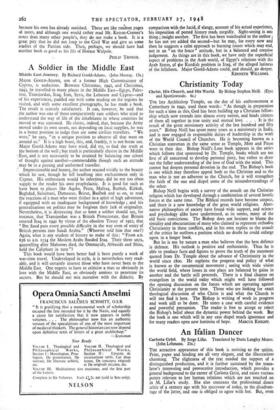Christianity Today
THE late Archbishop Temple, on the day of his enthronement at Cafiterbury in 5942, used these words : " As though in preparation for such a time as this, God has been building up a Christian fellow- ship which now extends into almost every nation, and binds citizens of them all together in true unity and mutual love. . . . It is the result of the great missionary activity of the last hundred and fifty years." Bishop Neill has spent many years as a missionary in India, and is now engaged in responsible duties of leadership in the work of the World Council of Churches. He is becoming known as a Christian statesman in the same sense as Temple, Mott and Paton were in their day. Bishop Neill's -Lent book appears in the series which follows that sponsored by Dr. Temple, books which are not first of all concerned to develop personal piety, but rather to draw out the fuller understanding of the love of God with the mind. This cannot but deepen personal devotion in the end. The Bishop's book is one which may therefore appeal both to the Christian and to the man who is not an adherent to the Church, for it will strengthen the faith of the one and dispel some of the misunderstandings of the other.
Bishop Neill begins with a survey of the assault on the Cliristian religion which has developed through a combination of several hostile forces at the same time. The Biblical records have become suspect, and there is a new knowledge of the great world religions. Alter- native philosophies of society have found wide support, and science and psychology alike have undermined, as its seems, many of the old basic convictions. The Bishop does not hesitate to blame the timidity and obscurantism of many who claimed to represent orthodox Christianity in these conflicts, and in his own replies to the assault of the critics he outlines a position which no doubt he could enlarge upon in a longer book.
But he is not by nature a man who believes that the best defence is defence. His outlook is positive and enthusiastic. Thus he is able to produce facts and figures to prove the truth of the statement quoted from Dr. Temple about the advance of Christianity in the world since 5800. He explains the progress and policy of what is known as the oecumenical movement ; seeing with wide vision the world field, where losses in one place are balanced by gains in another and the battle still proceeds. There is a final chapter on evangelism in the world today which might well have followed- the opening discussion on the forces which are operating against Christianity at the present time. Those who are looking for exact theological discussion of who Christ is and what the Church is will not find it here. The Bishop is writing of work in progress and work still to be done. _ He states a case with careful evidence and powerful persuasion. The reader is free to accept or reject the Bishop's belief about the dynamic power behind the work. But the book is one which will in any case dispel much ignorance and for many readers open new horizons of hope. MARCUS KNIGHT.


































 Previous page
Previous page